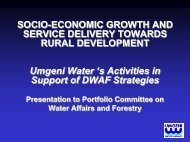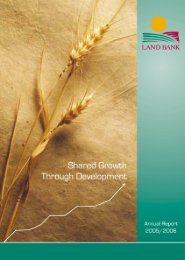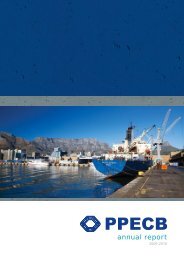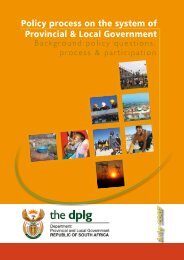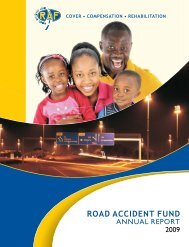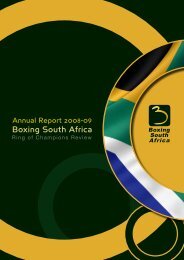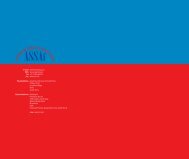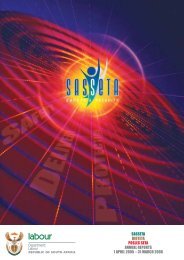Human Settlements Review - Parliamentary Monitoring Group
Human Settlements Review - Parliamentary Monitoring Group
Human Settlements Review - Parliamentary Monitoring Group
Create successful ePaper yourself
Turn your PDF publications into a flip-book with our unique Google optimized e-Paper software.
<strong>Human</strong> <strong>Settlements</strong> <strong>Review</strong>, Volume 1, Number 1, 2010<br />
firms to produce materials, or supports the<br />
artisans with training.<br />
To facilitate self-housing efforts, each of the<br />
three groups must have big overlaps with<br />
the communities – meaning that government<br />
needs to delegate certain powers to a much<br />
lower level as described above. This contrasts<br />
with the status quo whereby the lowest<br />
authority that can approve a building plan<br />
in an urban area is the municipality. The<br />
overlap also represents the grassroots NGOs<br />
actively engaged in community activism and<br />
mobilisation. Such groups remain in touch<br />
with people, understand their needs, dispense<br />
advice, and undertake advocacy on the<br />
community’s behalf. An additional proposal<br />
here is that innovative funding methods that<br />
are embedded in the community be used to<br />
avail credit to people. Here, the Noble-Peace-<br />
Prize-winning GRAMEEN Bank microfinance<br />
model suggests itself as a possibility for<br />
government to work closely with NGOs to get<br />
credit down to the grassroots. In this model,<br />
small loans are given to the very poor people<br />
with no collateral prerequisite. These loans are<br />
coupled with education of the recipients and<br />
strong encouragement to save. Through small<br />
self-organised groups (consisting of family,<br />
neighbours and friends) the loan recipients<br />
support each other in their poverty alleviation<br />
activities. Also, the peer-pressure from the<br />
groups ensures high loan repayment rates.<br />
Compared to providing a finished house,<br />
this micro-credit approach offers obvious<br />
advantages in terms of lower investment as<br />
well as the fact that government eventually<br />
recoups the money. The GRAMEEN model is<br />
also interesting because, although it includes<br />
shelter as one of its aims, it is only incorporated<br />
as part of a broader range of others such as<br />
clean water, basic hygiene and health, smallscale<br />
agriculture, and financial propriety (see<br />
www.grameen-info.org). The government<br />
would need to make funds available on good<br />
terms to kick start and maintain the microcredit<br />
process. This micro-financing model can<br />
bring banking ownership right down to small<br />
communities in the informal settlements so<br />
that they too start accumulating wealth through<br />
savings-based credit creation.<br />
In this proposal also, education institutions<br />
need to leave the comfort of the ivory tower<br />
to start having community presence and to<br />
impact positively on the communities. This<br />
requires a shift from exclusively elitist curricula<br />
to those that are more responsive to the needs<br />
of the majority poor. Community involvement<br />
would require that different disciplines work<br />
together – sociologists, doctors, social<br />
scientists, economists, architects, product<br />
designers and mass-communicators working<br />
with community participation to find ever<br />
innovative ways of imagining, designing,<br />
financing and coordinating the improvement<br />
of human habitats and life quality. Student<br />
projects could start getting them to engage<br />
with the society around them, to apply their<br />
minds to human settlement problems, and to<br />
create and disseminate innovative ideas in<br />
doses communities can digest. In this ethical<br />
role, university education does not just aim at<br />
transmitting knowledge but also at imparting<br />
values to graduates; values that will spur<br />
them into empathising with the indigent. The<br />
young minds can take full advantage of the<br />
self-organising possibilities in the internet<br />
to network with each other and to avail<br />
communities with useable information similar<br />
97



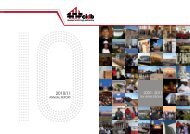
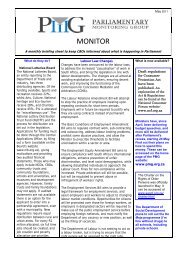
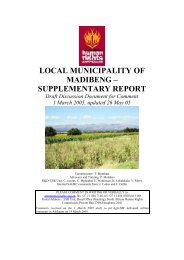
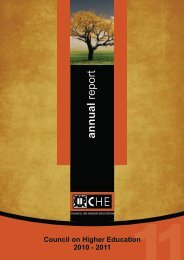
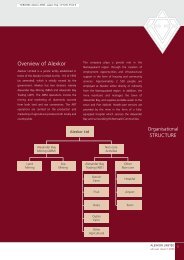
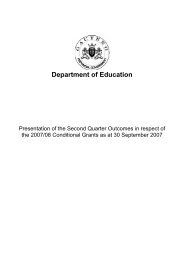
![National Research Foundation Annual Report 2008 / 2009 [Part 2]](https://img.yumpu.com/49774036/1/177x260/national-research-foundation-annual-report-2008-2009-part-2.jpg?quality=85)
